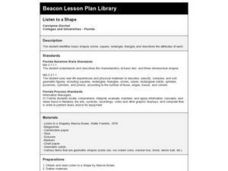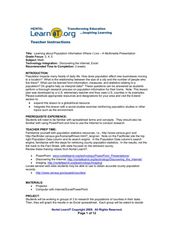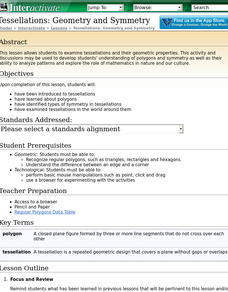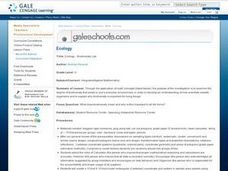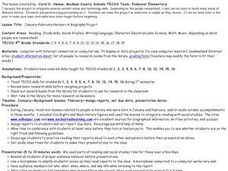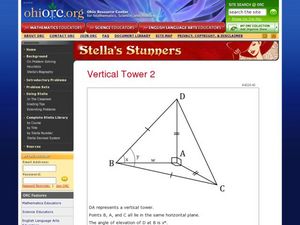Curated OER
Chaos
Young scholars experiment with several chaotic simulation, they build a working definition of chaos. Students reinforce their knowledge of basic probability and percents. They are reminded of previous knowledge that is pertinent to...
Curated OER
No Title
Sixth graders, after reviewing and studying the basics of recording, analyzing and presenting data, create on graph paper a bar or line graph to represent given data and then interpret the data. They answer questions about the given data...
Curated OER
Listen to a Shape
First graders identify basic shapes (circle, square, rectangle, triangle) and describes the attributes of each. They use magazines to find examples of each shape, and then make a collage.
Curated OER
Learning and Population Information - Where I Live
Students study their county populations in a multimedia presentation format. In this populations lesson, students work in groups of 3 to research the county populations in their state. Students chart their results in an Excel document...
Curated OER
Irregular Fractals
Middle schoolers study and research irregular fractals and construct a few based on their research. Students practice pattern recognition skills and plane geometry skills calculating dimensions on the Fractured Pictures activity.
Curated OER
Elastic Band Shapes
Students identify basic shapes (triangle, square, rectangle, circle), create shapes with different body parts, and create shapes at various levels (high, low)
Curated OER
Area of Parallelograms
Seventh graders review the process of finding the area of a rectangle and complete a couple of examples as a class. They discuss what a parallelogram is and what the formula would be for finding its area. They listen to an explanation...
Curated OER
Subtracting Whole Numbers and Decimals
In this math worksheet, students learn to subtract whole numbers and decimals. Students are given step by step directions on how to solve one sample problem, then complete 5 examples on their own. Example: 6.57 - 3.28. There is...
Curated OER
Geometry and Symmetry
Students examine tessellations and their geometric properties. The lesson plan and discussions may be used to develop students' understanding of polygons and symmetry as well as their ability to analyze patterns.
Curated OER
Interior Designer for a Day
Seventh graders organize a 20 x 17 room with a given set of furniture pieces. Arrangement is to be based on maximum comfort and practicality. This lesson is a good way to teach and reinforce the mathematical concept of area.
Curated OER
A Recipe for Reading: Asian Style Rice and Eggs
Learners read, write about, and cook with rice in this home economics lesson. They reflect on the experience eating rice at home or in other ethnic foods.
Curated OER
Food Chains
Students study food chains by creating their own slide show using KidPix. They compare information after sharing their slide shows as a whole group. As the children are watching the slide shows of their peers, they tally every time...
Curated OER
Tantalizing Tessellations Lesson III: Creating a Slide Translation
Students explore tessellations and the artwork of M.C. Escher. They view and discuss a video about M.C. Escher, create a slide template out of cardboard, and create a poster with their tessellation pattern.
Curated OER
Monarch Chrysalis
Students examine the last stage of the monarch butterfly. In this life cycles instructional activity, students read the book The Very Hungry Caterpillar and study photos of the monarch life cycle. Students illustrate the third stage of...
Teach Engineering
Cell Membrane Color Sheet and Build a Cell Membrane
A cell of another color is still a cell. Pupils color a cell to identify its structures in the fourth segment of a seven-segment series. Groups work together to build a three-dimensional cell membrane segment, which is combined with...
Curated OER
Three-Digit Addition and Subtraction With Regrouping
Second graders access prior knowledge of addition and subtraction using two-digit numbers and calculate easily with them. In this three-digit addition lesson, 2nd graders learn to add and subtract three-digit numbers with and without...
Curated OER
Problem Solving - A Part of Everyday Thinking
Students master the process of applying critical thinking to each and every problem/task that confronts them in their daily undertakings. Further, this activity can serve as a base reference and model for other problems that may arise.
Curated OER
Relating Division and Subtraction
Third graders relate the process of division to subtracting equal groups. Through guided practice and teacher demonstration, they complete division problems using a subtraction method. Students complete problems independently for...
Curated OER
The Acoustics House
Students study how drums produce sound by building and playing a simple drum. They measure the diameter of their can, then mark a circle two inches larger in diameter on their piece of plastic with the marker or chalk, and cut out the...
Curated OER
Ecology - Biodiversity Lab
Studnents examine the degree of biodiversity that exists in one's everyday environment, in order to develop an understanding of how scientists classify organisms and to explain why biodiversity is important for living things.
Curated OER
A Hero Biography Project
Fourth graders study historical significant people born in January and February and note their accomplishments. Using given websites, 4th graders collect biographical information and participate in activities about a specified hero. ...
Curated OER
Vertical Tower
In this trigonometry worksheet, 11th graders are given a tower built by different angles and asked to prove the sides are true using the theorems of trig angles. There are 3 questions with an answer key.
Curated OER
Vertical Tower 2
In this trigonometry instructional activity, students prove that for the given conditions of the problem that cos y = cos2 x. The one page instructional activity contains one problem with the solution.
Curated OER
Equivalent forms of Fractions
Fourth graders use kidspiration software to demonstrate understanding of the concept of equivalent fractions. Using a combination of manipulatives, computer software and writing teachers can easily assess student mastery of number sense.


